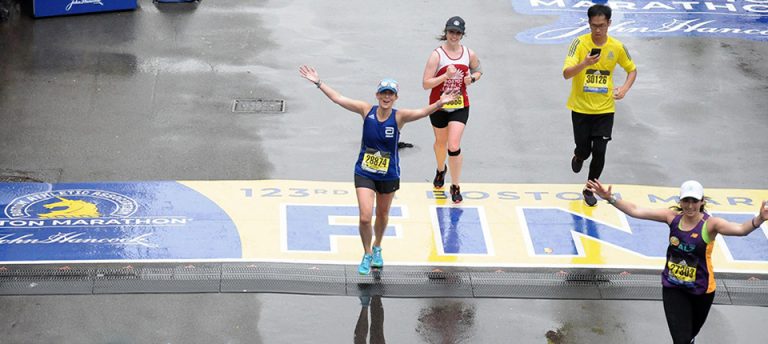Can Marathon Runners Be Muscular
Yes, marathon runners can be muscular. Running can help develop lean muscle mass in the body.
Marathon runners often combine strength training with their running routine to build and maintain muscle strength, which can improve their performance and overall fitness levels. While endurance training is a core aspect of marathon preparation, incorporating muscle-building exercises can complement a runner’s training regimen.
Balancing cardiovascular endurance with muscular strength can enhance a runner’s speed, power, and resilience during long-distance races. Additionally, having strong muscles can help prevent injuries and improve running efficiency. We will explore the relationship between marathon running and muscle development, debunk common myths, and provide tips for marathon runners looking to build muscle effectively.
The Relationship Between Marathon Running And Muscle Mass
Marathon running can lead to lean muscle mass, but it’s rare for runners to have a bulky appearance. Endurance training can impact muscle growth, but regular resistance training may help marathon runners maintain muscle mass. Balancing both forms of exercise can lead to a lean and muscular physique for marathon runners.
` Marathon running is a strenuous physical activity that requires a significant level of endurance and cardiovascular fitness. Many people wonder if marathon runners can also be muscular, as the common perception is that endurance training leads to a reduction in muscle mass. However, the relationship between marathon running and muscle mass is more complex than it seems. In this article, we will explore the physiological impact of marathon running and debunk the myth surrounding muscularity and marathon running. `` Physiological Impact Of Marathon Running `
` Marathon running has several physiological effects on the body, including the development of specific muscle groups involved in running. While it is true that marathon runners do not typically have the same level of muscle mass as bodybuilders or powerlifters, they still possess a considerable amount of muscle strength and endurance. One of the key factors that contribute to a runner’s muscle mass is their training regimen. Marathon runners engage in a combination of long-distance running, interval training, and strength exercises to improve their performance. These exercises specifically target the muscles involved in running, such as the quadriceps, hamstrings, calves, and glutes. The repetitive nature of long-distance running also promotes lean muscle development. Continuous running for extended periods forces the muscles to adapt and become more efficient. As a result, marathon runners generally have toned and defined muscles rather than bulky ones. Moreover, endurance training stimulates the body’s production of human growth hormone (HGH), which plays a significant role in muscle growth and repair. This hormone helps marathon runners maintain muscle mass despite the prolonged exercise that can put stress on their muscles. `` Myth Of Muscularity And Marathon Running `
` Contrary to popular belief, marathon running does not necessarily lead to a loss of muscle mass. While runners may have a slightly lower percentage of body fat due to the high caloric expenditure during training, this does not mean they lack muscle. It’s important to understand that the main focus of marathon runners is endurance rather than building significant muscle size. This distinction is essential because muscle hypertrophy (enlargement of muscle fibers) requires specific types of training, including resistance exercises and high-intensity strength training, which are not the primary goals of marathon runners. Additionally, marathon runners often have a body composition that is more suited to long-distance running. Having excessive muscle mass can actually have a detrimental effect on performance, as it increases the energy demands and can lead to increased fatigue during prolonged running. In conclusion, marathon runners can indeed have muscular physiques, although their muscles may not be as noticeable as those of bodybuilders or weightlifters. The relationship between marathon running and muscle mass is influenced by various factors, including training regimens, repetitive endurance training, and the body’s production of growth hormone. It’s essential to dispel the myth that endurance training leads to a loss of muscle mass and recognize that marathon runners possess a unique blend of muscle strength and endurance that enables them to excel in their chosen sport.Training Approaches For Muscular Marathon Runners
Incorporating muscular strength training into marathon runners’ regimen can enhance performance and reduce the risk of injuries. Below are some key approaches for marathon runners looking to build muscle.
Resistance Training
Integrating resistance training targets muscle groups essential for running, such as legs, core, and upper body, improving overall strength and power.
Balancing Cardio And Strength Workouts
Striking a balance between cardio sessions and strength training ensures optimal performance without compromising endurance or muscle gains.
Nutritional Considerations For Muscular Marathon Runners
When it comes to marathon runners who aim to build and maintain muscle mass, optimal nutrition plays a crucial role. Nutritional considerations for muscular marathon runners go beyond just fueling endurance; they also involve supporting muscle recovery and growth.
Importance Of Protein Intake
Protein intake is key for muscular marathon runners to repair muscle tissue post-training. Adequate protein helps rebuild and strengthen muscles for improved performance.
Nutrient Timing And Supplements
Strategic nutrient timing is vital for muscle recovery and growth. Consuming protein and carbohydrates post-exercise can enhance muscle repair and replenish energy stores.

Credit: www.runnersworld.com
Body Composition And Marathon Performance
Marathons demand a combination of endurance, strength, and mental fortitude. Many people wonder whether having a muscular body is advantageous or detrimental for a marathon runner. In this post, we will explore the impact of muscle mass on running economy and the importance of balancing weight and strength for endurance. Let’s delve deeper.
Impact Of Muscle Mass On Running Economy
Having adequate muscle mass is crucial for overall performance and injury prevention, but runners often wonder if carrying extra muscle can hinder their marathon success.
Research shows that excess muscle mass can lead to increased energy expenditure during running due to the higher weight being carried. However, having appropriately developed muscles can contribute to better running economy, which means running faster while using less energy.
How does this work? Well, during running, the muscles of the lower body, including the quadriceps, hamstrings, and calves, play a major role in propelling the body forward. A well-developed muscular system in these areas can generate more power with each stride, leading to greater efficiency.
While there is an optimal level of muscle mass for each individual runner, it is essential to strike a balance between strength and weight for marathon success.
Balancing Weight And Strength For Endurance
Weight is a significant factor in marathon performance. The more weight a runner carries, the more energy is needed to move that weight, potentially slowing them down. Hence, it is necessary to find the right balance between strength-building and weight management.
| Balancing Weight and Strength Tips: |
|---|
| Focus on functional strength exercises that target the muscles used in running. |
| Incorporate strength training into your routine, but prioritize high repetitions with lighter weights to maintain lean muscle mass without excessive bulk. |
| Include regular endurance-focused cardio sessions to burn calories and maintain a healthy body composition. |
| Optimize your nutrition to support muscle recovery and maintenance while managing weight effectively. |
| Remember that each individual is unique, so consult with a coach or trainer to develop a personalized strength and weight management plan. |
By finding the right balance between strength and weight, marathon runners can optimize their performance and reduce the risk of injury.
Ultimately, the answer to whether marathon runners can be muscular lies in achieving the right balance. Properly developed muscles can enhance running economy, but excess weight from excessive muscle mass can hinder performance. Consulting with professionals and maintaining a personalized training plan ensures a runner’s body composition is optimized for marathon success.
Case Studies Of Muscular Marathon Runners
Case studies of muscular marathon runners provide compelling evidence that exceptional muscular development and long-distance running prowess can go hand in hand. The popular notion that marathon runners must be lean and wiry is being challenged by the success of these muscular athletes who have defied conventional wisdom. Let’s delve into some profiles of these successful muscular runners and gain insights into their training and diet regimes.
Profiles Of Successful Muscular Runners
One notable example is Alexi Pappas, an elite distance runner known for her impressive muscular physique and exceptional marathon performances. Her achievements not only dispel the myth that marathoners must be slender, but also showcase the incredible power and strength that muscular runners can possess. Another inspiring figure is Brendan Brazier, a former professional Ironman triathlete, who defies the traditional marathoner physique with his robust muscular build.
Training And Diet Insights From Experts
- Emphasizing Strength Training: Common among these muscular marathon runners is their dedication to strength training, which plays a pivotal role in developing and maintaining their muscular physiques while supporting their long-distance running capabilities.
- Optimized Nutrition: Expert nutritionists often advocate a balanced approach to nutrition for muscular marathon runners, focusing on adequate protein intake to support muscle recovery and repair, while also ensuring sufficient carbohydrate and fat consumption for sustained endurance.
- Strategic Mileage Management: Contrary to the notion that increased mileage leads to leaner physiques, these runners have emphasized the importance of strategic mileage management, cleverly integrating high-intensity workouts and cross-training to maintain their muscular strength while improving their endurance.
- Hydration and Recovery Practices: Amidst their relentless training schedules, these athletes prioritize optimal hydration and recovery practices, recognizing their pivotal roles in supporting muscular development and overall marathon performance.
Credit: www.quora.com

Credit: www.mensjournal.com
Frequently Asked Questions For Can Marathon Runners Be Muscular
Can You Run Marathons And Still Be Muscular?
Yes, it is possible to run marathons and still maintain muscle mass. Regular strength training, proper nutrition, and a balanced exercise plan can help you achieve this. By combining cardio and strength training, you can be both fit for endurance running and maintain muscular strength.
Can A Marathon Runner Be A Bodybuilder?
Yes, a marathon runner can also be a bodybuilder by incorporating strength training with their endurance workouts.
Can You Be A Good Runner With Muscle?
Yes, having muscle can improve your running performance by providing strength and power. It can enhance speed and endurance.
Conclusion
It’s clear that marathon runners can indeed be muscular. By incorporating strength training exercises, runners can build lean muscle mass, which can benefit their overall performance and help prevent injuries. It’s important for runners to find the right balance between aerobic and anaerobic exercises to optimize their performance and maintain a strong physique.
So, whether you’re a marathon runner or considering starting, remember that building muscle can go hand in hand with long-distance running. Keep pushing your limits and enjoy the journey!






